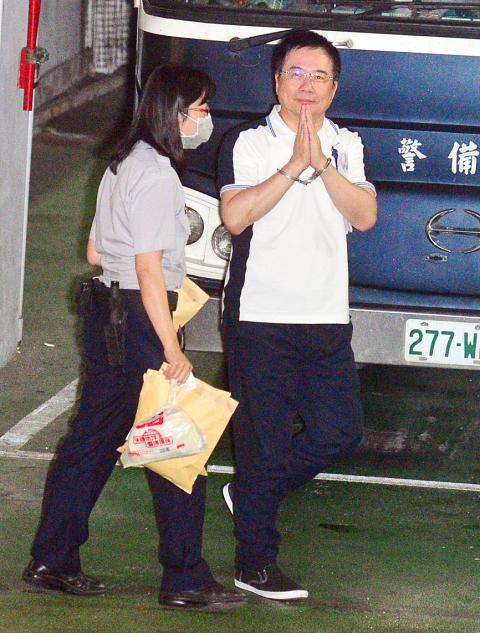The Taipei District Court yesterday detained former Chinese Nationalist Party (KMT) Central Policy Committee director Alex Tsai (蔡正元) over allegations that he embezzled NT$370 million (US$12.17 million) from Central Motion Pictures Corp (CMPC, 中央電影公司).
A judge ordered him held incommunicado, saying that there was a possibility he might flee, tamper with evidence or attempt to communicate with other principles in the case.
He was put in handcuffs and taken to the Taipei Detention Center in the morning.

Photo: Wang Yi-sung, Taipei Times
After questioning Tsai, his wife Queena Hung (洪菱霙) and seven other people, the Taipei District Prosecutors’ Office said it has sufficient evidence to charge Tsai with embezzlement, breach of trust and other offenses, stemming from a series of financial transactions in the late 2000s connected with CMPC.
Democratic Progressive Party legislators yesterday urged prosecutors to reopen a shelved investigation into former president Ma Ying-jeou’s (馬英九) role in the sale of CMPC and other KMT-related assets while he was party chairman.
Taipei district prosecutors said that in 2006 Tsai talked investor Chuang Wan-chun (莊婉均) into purchasing 80 percent of CMPC shares for NT$3.1 billion, asking Cheng Uei Precision Industry (正崴精密工業) chairman Gou Tai-chiang (郭台強) and his wife, Lor Yu-chen, (羅玉珍) to act as guarantors of the deal.
Gou is a younger brother of Terry Gou (郭台銘), chairman of Hon Hai Precision Industry Co (鴻海精密).
The three parties reached an agreement that ownership of the shares would be registered to Apollo Investment Co (阿波羅公司), a company founded by Tsai, prosecutors said, adding that Tsai, Chuang and Lor ran Apollo together.
Later in 2006, Tsai convened a meeting of shareholders to discuss a capital reduction proposal, and they resolved to reduce CMPC’s capital by NT$580 million, which was then entrusted to Apollo.
However, Tsai signed a contract with himself on behalf of Apollo, entrusting NT$430 million of the capital reduction funds to his name, prosecutors said.
Apollo then transferred the funds to the private accounts of Queena Hung, who was the head of Tsai’s legislative office at the time, and Tsai himself, prosecutors said.
Tsai also used the funds to invest on his own account, including in the property market, and the overall movement of funds eventually resulted in NT$240 million in losses for Apollo, prosecutors said.
In July 2010, when Apollo’s contract entrusting funds to Tsai expired, Tsai transferred NT$130 million to accounts held by Apollo, which included the account of a company registered under Hung’s name, prosecutors said.
Tsai sent somebody to withdraw the funds and deposit them in one of Tsai’s accounts, and the former lawmaker used the money to buy property, stocks and foreign currency and pay his credit card bills, prosecutors said.
During the detention hearing, Tsai denied all of the allegations and described them as political persecution.
Tsai’s lawyer said he would file an appeal against his detention.

CHAOS: Iranians took to the streets playing celebratory music after reports of Khamenei’s death on Saturday, while mourners also gathered in Tehran yesterday Iranian Supreme Leader Ayatollah Ali Khamenei was killed in a major attack on Iran launched by Israel and the US, throwing the future of the Islamic republic into doubt and raising the risk of regional instability. Iranian state television and the state-run IRNA news agency announced the 86-year-old’s death early yesterday. US President Donald Trump said it gave Iranians their “greatest chance” to “take back” their country. The announcements came after a joint US and Israeli aerial bombardment that targeted Iranian military and governmental sites. Trump said the “heavy and pinpoint bombing” would continue through the week or as long

TRUST: The KMT said it respected the US’ timing and considerations, and hoped it would continue to honor its commitments to helping Taiwan bolster its defenses and deterrence US President Donald Trump is delaying a multibillion-dollar arms sale to Taiwan to ensure his visit to Beijing is successful, a New York Times report said. The weapons sales package has stalled in the US Department of State, the report said, citing US officials it did not identify. The White House has told agencies not to push forward ahead of Trump’s meeting with Chinese President Xi Jinping (習近平), it said. The two last month held a phone call to discuss trade and geopolitical flashpoints ahead of the summit. Xi raised the Taiwan issue and urged the US to handle arms sales to

State-run CPC Corp, Taiwan (CPC, 台灣中油) yesterday said that it had confirmed on Saturday night with its liquefied natural gas (LNG) and crude oil suppliers that shipments are proceeding as scheduled and that domestic supplies remain unaffected. The CPC yesterday announced the gasoline and diesel prices will rise by NT$0.2 and NT$0.4 per liter, respectively, starting Monday, citing Middle East tensions and blizzards in the eastern United States. CPC also iterated it has been reducing the proportion of crude oil imports from the Middle East and diversifying its supply sources in the past few years in response to geopolitical risks, expanding

Pro-democracy media tycoon Jimmy Lai’s (黎智英) fraud conviction and prison sentence were yesterday overturned by a Hong Kong court, in a surprise legal decision that comes soon after Lai was jailed for 20 years on a separate national security charge. Judges Jeremy Poon (潘兆初), Anthea Pang (彭寶琴) and Derek Pang (彭偉昌) said in the judgement that they allowed the appeal from Lai, and another defendant in the case, to proceed, as a lower court judge had “erred.” “The Court of Appeal gave them leave to appeal against their conviction, allowed their appeals, quashed the convictions and set aside the sentences,” the judges